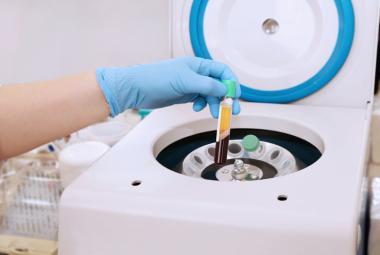Caffeine is the most widely consumed stimulant in the world.1 As such, the safety of caffeine-containing drinks during lactation can raise a lot of questions for new mothers. Post-partum fatigue and frequent sleep interruptions while caring for a new baby can lead moms to seek out energy drinks and other caffeinated beverages to help with alertness during the day. This can lead to a vicious cycle of needing caffeine to remain awake during the day, then caffeine interrupting sleep quality for mom, thus reinforcing the reliance on more caffeine the next day. While each mother should make her own decision regarding caffeine use during lactation, the CDC states that caffeine consumption in moderation (<300 mg/d) is considered generally safe for most breastfeeding mothers and their babies.2 However, there are several factors that lactating mothers need to be made aware of when deciding whether caffeine is right for them.
Caffeine Metabolism
The half-life, or time it takes for the body to metabolize half of the amount of caffeine consumed, differs between adults and babies. The half-life in adults is 3-7 hours, whereas the half-life is up to 120 hours for the newborn or preterm baby.3 This is because newborns lack the necessary enzymes to metabolize caffeine until several days after birth.4 The half-life for caffeine metabolism reduces to about 14 hours once the baby has reached 3-5 months of age.4 Given these differences in the amount of time it takes for babies to metabolize caffeine, special consideration must be given to newborns and preterm infants who may be more susceptible to the effects of caffeine due to these differences in the amount of time it takes for babies to metabolize caffeine. Extreme caution must be given to the use of caffeine during lactation if the newborn has any known heart conditions or has gastro-esophageal reflux disease, as caffeine may affect these conditions.5
Genetic differences in the metabolism and clearance of caffeine have been found.3 Individual variability in the brain receptors that bind caffeine also influences a person’s response to the stimulant.3 For most breastfeeding mothers, consuming <300 mg of caffeine (equal to three 8oz cups of coffee) is considered safe.1 However, this might be too much for some infants due to genetic differences in caffeine effects and metabolism.
Transfer of Caffeine in Breastmilk
It is estimated that between 0.06% and 1.5% of maternal caffeine consumed is transferred to the infant via breastmilk.6 This means for a mother who consumes 300 mg of caffeine in a day, the dose to the infant would be between 0.18 mg and 4.5 mg of caffeine. For comparison, neonates in the intensive care unit often receive around 5 mg/kg of caffeine as a treatment for breathing issues. By limiting caffeine intake to <300 mg per day, the infant would receive a minimal dose of caffeine through the breastmilk, even less than that of a therapeutic dose deemed safe for treatment of neonates.
Energy Drinks and Dietary Supplements
Energy drinks have variable amounts of caffeine and also contain added ingredients—vitamins, herbal supplements, amino acids, sugar derivatives—that may not have established safety data.4 The table below includes several commonly added herbal supplements that are usually listed as part of the “proprietary blend” for energy drinks on the nutrition label. This is not an exhaustive list.
|
Herbal Supplement |
Reason for adding |
Side effects |
Lactation risk category |
|
Taurine |
Enhance endurance performance |
- |
Safety data not established, not recommended |
|
Guarana |
Natural stimulant, use in weight loss |
Longer stimulatory effect |
Safety data not established, not recommended |
|
Ginseng and Ginkgo |
Enhance cognitive performance |
Drug interactions (antidepressants, warfarin, insulin); nausea, vomiting, diarrhea, palpitations, restlessness, headaches, sleep disturbances |
Moderately safe |
|
Yerba mate |
Stimulant, weight loss |
- |
Safety data not established, not recommended |
For many of these added herbal substances safety data has not been established, and therefore, they are not recommended for breastfeeding mothers. Furthermore, many energy drinks have B-vitamins commonly added. These same vitamins can be found in prenatal vitamins. Ingestion of excessive doses can lead to systemic toxicity.4
Some energy drinks may also contain weight-loss dietary supplements or have more than one serving per container.4 Since energy drinks are considered “dietary supplements,” they are not tightly regulated by the FDA like medications are.7 This means that energy drinks can contain proprietary blends that contain caffeine, without being required to include the amount of caffeine found in the blend. The addition of herbal supplements with unknown safety data and B-vitamins makes energy drinks a riskier source of caffeine for breastfeeding mothers. Furthermore, the addition of indeterminate amounts of caffeine to proprietary blends can pose a serious obstacle to breastfeeding mothers who wish to keep their caffeine intake to a safe level of <300 mg per day.
Other Caffeine Sources
Breastfeeding mothers must be aware of other caffeine sources in their diet, such as chocolate which contains natural occurring caffeine. Caffeine is also added to products such as pre-workout supplements often used before exercise and medications such as Excedrin migraine. Knowing the exact amount of caffeine consumed is complicated by the absence of a requirement to report caffeine amounts on nutrition labels. However, breastfeeding mothers who consume any sources of caffeine should be aware of the approximate amount of caffeine they are consuming on a daily basis.
The following table includes commonly consumed caffeine sources and their approximate caffeine content.
|
Caffeinated product |
Serving size |
Amount of caffeine (mg) |
|
5 Hour Energy |
2 oz |
138 |
|
Amino Energy Pre-Workout |
2 scoops |
100 |
|
Bang Energy |
16 oz |
300 |
|
Monster Energy |
16 oz |
140-240 |
|
Red Bull |
8.5 oz |
115 |
|
|
|
|
|
Black tea |
8 oz |
50-110 |
|
Coffee, regular |
8 oz |
75-150 |
|
Cola |
12 oz |
35-50 |
|
Espresso shot |
1.5 oz |
70-80 |
|
Green Tea |
8 oz |
20-60 |
|
Mountain Dew |
12 oz |
50-80 |
|
|
|
|
|
Dark Chocolate |
1 oz |
12 |
|
|
|
|
|
Midol Complete |
2 caplets |
120 |
|
Excedrin Migraine |
2 tablets |
130 |
For a more extensive list: https://www.caffeineinformer.com/the-caffeine-database
The Bottom Line
While each mother should make her own decision regarding caffeine use during lactation, the CDC states that caffeine consumption in moderation (<300 mg/day) is considered generally safe for most breastfeeding mothers and their babies.2 Mothers are encouraged to monitor their individual infants for side effects of caffeine intolerance in their infants. These signs include, but are not limited to: irritability, jitteriness, and sleep disturbance.5 If a baby exhibits these symptoms, a reduction in caffeine intake is suggested as individual babies will have different tolerances to caffeine. While moderate caffeine consumption is considered generally safe for most lactating mothers and their babies, it is of utmost importance for mothers to be aware of how much caffeine a substance contains, to approximate total caffeine that they are consuming in a day, and to adjust intake depending on the baby’s response. As always, breastfeeding mothers are encouraged to speak to their healthcare professional if further questions arise.
For more information on caffeine and breast milk:
LactMed: https://www.ncbi.nlm.nih.gov/books/NBK501467/
Emily Hecox, MS3
Christine D Garner, PhD, RD, CLC
Kaytlin Krutsch, PharmD
Resources:
1. Ferré S. Caffeine and Substance Use Disorders. Journal of Caffeine Research. 2013;3(2):57-58. doi:https://doi.org/10.1089/jcr.2013.0015
2. CDC. Breastfeeding: Maternal Diet, Caffeine. Accessed March, 2021. https://www.cdc.gov/breastfeeding/breastfeeding-special-circumstances/diet-and-micronutrients/maternal-diet.html#:~:text=Caffeine%3A,to%203%20cups%20of%20coffee
3. Nehlig A, Alexander SP. Variation in caffeine metabolism. Pharmacological Reviews. 2018;70(2):384-411. doi:https://doi.org/10.1124/pr.117.014407
4. Thorlton J, Ahmed A, Colby DA. Energy drinks: Implications for the breastfeeding mother. American Journal of Maternal Child Nursing. 2016;41(3):179-185. doi:10.1097/NMC.0000000000000228
5. LactMed. Caffeine. Accessed March, 2021. https://www.ncbi.nlm.nih.gov/books/NBK501467/
6. Hale TW. Medications and Mother’s Milk 2021. 19th ed. Springer Publishing Co, LLC; 2020.
7. USFDA. Spilling the beans: How much caffeine is too much? Accessed March, 2021. https://www.fda.gov/consumers/consumer-updates/spilling-beans-how-much-caffeine-too-much







